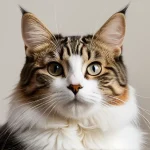Essential Nutritional Needs for Pregnant Cats
Pregnant cats require a carefully balanced pregnant cat diet to support both the mother and her developing kittens. Key nutrients for expectant queens include high-quality proteins and essential amino acids, which aid fetal growth and tissue repair. Fatty acids, especially DHA, are crucial for brain and eye development in kittens. Vitamins like A, D, and E, along with minerals such as calcium and phosphorus, support bone formation and overall health during pregnancy.
Calorie intake naturally rises throughout gestation. Early pregnancy demands modest increases, while the final trimester requires up to double the normal energy intake. This gradual adjustment ensures proper weight gain without overburdening the mother’s system.
Have you seen this : Comprehensive manual for feeding your sick cat with a syringe: proven strategies to entice a fussy eater
Tailored nutrition throughout gestation is essential. Nutritional requirements change with the pregnancy stage, so feeding a diet formulated explicitly for pregnant cats is ideal. Proper cat pregnancy care involves monitoring these evolving needs closely, providing adequate hydration, and avoiding nutrient imbalances that could compromise health. This comprehensive approach supports both the expectant queen’s wellbeing and the successful delivery of healthy kittens.
Essential Nutritional Needs for Pregnant Cats
Understanding the pregnant cat diet is crucial for supporting the health of expectant queens and their kittens. Key nutrients for expectant queens include high-quality proteins and essential amino acids, which are vital for fetal development and maintaining the mother’s muscle health. Fatty acids, particularly DHA, play a significant role in neurological development, while vitamins and minerals such as calcium, phosphorus, and folic acid are necessary for bone growth and preventing birth defects.
Have you seen this : Is your cat a candidate for behavioral therapy? choosing the perfect therapist for feline health and happiness
Nutritional requirements shift throughout pregnancy. Calorie intake typically increases by 20-50%, reflecting the growing energy demands. This means the quality and quantity of food must adapt to ensure proper cat pregnancy care. For instance, late-stage pregnant cats require more calorie-dense meals to support rapid fetal growth.
Tailored nutrition during gestation not only boosts the mother’s well-being but also improves kitten survival rates. Consulting a veterinary professional can help create a balanced diet plan specific to your cat’s needs, ensuring all nutrients are addressed without overfeeding. Proper attention to these nutritional essentials lays the foundation for a healthy pregnancy and positive outcomes for both mother and kittens.
Recommended Food Types and Feeding Schedules
Choosing the best food for pregnant cats ensures both the mother and kittens receive optimal nourishment. Commercially available pregnancy cat food is formulated to meet increased nutritional requirements with balanced proteins, fatty acids, vitamins, and minerals. These diets offer consistency and are often preferred for their convenience and precise nutrient profiles.
Homemade meals can be considered but require careful planning to avoid nutrient gaps. Including high-quality animal protein sources and supplements as advised is essential for homemade options.
Wet food provides excellent hydration and palatability, making it a valuable option during pregnancy when cats can become finicky eaters. Dry food is convenient and helps maintain dental health, so a mixed diet combining wet and dry formats can offer comprehensive benefits.
Regarding feeding schedules, cats often begin with modest increases in portion size during early pregnancy. By mid-gestation, feeding frequency should rise to 3–4 small meals daily. In the final trimester, providing calorie-dense meals multiple times a day supports the queen’s escalating energy needs. Frequent, balanced feeding promotes steady weight gain and supports fetal development efficiently.
Recommended Food Types and Feeding Schedules
Choosing the best food for pregnant cats requires balancing convenience, nutrition, and individual cat preferences. Many pet owners opt for commercially available pregnancy cat food specially formulated to meet the delicate nutritional requirements of expectant queens. These diets ensure the right balance of proteins, fats, vitamins, and minerals, supporting fetal growth and maternal health. However, some prefer homemade meals, which need careful planning to avoid nutrient imbalances that can jeopardize cat pregnancy care.
In terms of texture and moisture, wet food is often recommended since it provides hydration and is generally more palatable. Dry food offers convenience and dental benefits, while a mixed diet combines the advantages of both. Choosing the right combination depends on your cat’s preferences and health status.
Feeding schedules should adapt to pregnancy stages. Early pregnancy may require standard meal timing but increased portion size, while late pregnancy benefits from frequent, smaller meals to accommodate a reduced stomach capacity and higher energy demands. Regularly scheduled feedings help maintain steady nutrition, essential for a healthy pregnancy and kitten development.
Customizing Portion Sizes and Adjustments for Each Trimester
Adjusting cat portions during pregnancy aligns with the shifting nutritional requirements at each stage. In the first trimester, queens typically need only a slight increase in calories—about 10-20% more than normal—since fetal growth is still minimal. Maintaining a balanced pregnant cat diet with quality proteins and essential nutrients remains crucial at this stage, even if appetite changes are subtle.
During the second trimester, gradual increases in meal sizes and frequency become necessary. Feeding guidelines recommend offering 3 small meals daily to accommodate the queen’s growing energy needs without overwhelming her digestion. Monitoring weight gain is important—steady, moderate increases indicate healthy fetal development.
The final trimester demands the greatest adjustments. Calories may need to double compared to pre-pregnancy amounts. Frequent, calorie-dense meals support rapid fetal growth and prepare the mother for lactation. Appetite can fluctuate, so careful observation helps detect decreased intake that might signal problems.
Adapting portions to each cat pregnancy stage enables optimal nourishment. Consistent cat pregnancy care and timely portion adjustments safeguard the health of both mother and kittens throughout gestation.
Essential Nutritional Needs for Pregnant Cats
The pregnant cat diet must prioritize core key nutrients for expectant queens to support both maternal health and fetal development. High-quality proteins and essential amino acids serve as building blocks for growing tissues. Fatty acids, particularly DHA, are vital for nervous system development in kittens. Vitamins such as A, D, and E, coupled with minerals like calcium and phosphorus, ensure proper bone formation and metabolic functions.
Understanding changing nutritional requirements is fundamental in cat pregnancy care. Calorie demands rise gradually, especially in the last trimester where energy intake can double compared to pre-pregnancy levels. This increase helps sustain fetal growth and supports milk production preparation.
Tailored nutrition throughout gestation helps prevent complications. For instance, inadequate calcium can lead to eclampsia, while protein deficiency may impair kitten viability. Adjusting diet quality and quantity according to pregnancy stages — early, mid, and late — remains essential. This approach meets shifting needs without risking excessive weight gain or nutrient imbalances, optimizing health outcomes for queen and kittens.
Dietary Dos and Don’ts for Expectant Queens
Providing a pregnant cat diet that includes safe ingredients is fundamental for effective cat pregnancy care. Essential supplements such as taurine, calcium, and folic acid support fetal growth and maternal health. Including lean proteins like cooked chicken or turkey ensures availability of necessary amino acids. Omega-3 fatty acids, found in fish oils, enhance neurological development in kittens.
Conversely, several foods must be avoided during pregnancy. Raw or undercooked meat and eggs pose infection risks. Onions, garlic, chocolate, caffeine, alcohol, and certain artificial sweeteners are toxic and should never be included in any food options for expectant queens. Dairy products can cause digestive upset and should be given cautiously.
Nutrition mistakes often involve overfeeding or offering low-quality treats. Excessive calorie intake without nutritional balance can lead to obesity, complicating the pregnancy. Treats must be given sparingly and composed of safe, wholesome ingredients.
Careful attention to diet maximizes benefits for both mother and kittens. Consistent adherence to safe foods, appropriate supplements, and avoidance of harmful item lowers the risk of complications and supports overall health during gestation.
Essential Nutritional Needs for Pregnant Cats
A well-balanced pregnant cat diet must provide adequate key nutrients for expectant queens to support both their health and fetal development. Central to this are high-quality proteins and essential amino acids, which serve as the fundamental building blocks for growing tissues and maintain maternal muscle. Fatty acids such as DHA play a pivotal role in the neurological development of kittens, while vital vitamins (A, D, and E) and minerals like calcium and phosphorus are crucial for bone formation and metabolic support.
Calorie intake adjusts significantly during pregnancy to meet changing nutritional requirements. Early in gestation, energy needs increase modestly, but in the final trimester, calorie consumption can nearly double to fuel rapid fetal growth and prepare for lactation. This makes continuous monitoring and gradual dietary adjustments a core aspect of effective cat pregnancy care.
Tailoring nutrition throughout gestation enhances pregnancy outcomes, preventing deficiencies that might jeopardize queen or kitten health. Balanced diets minimize risks such as eclampsia from calcium shortage or growth retardation related to protein deficiency. Thus, understanding specific nutrient roles and adapting calorie intake ensures comprehensive support for both mother and offspring.

